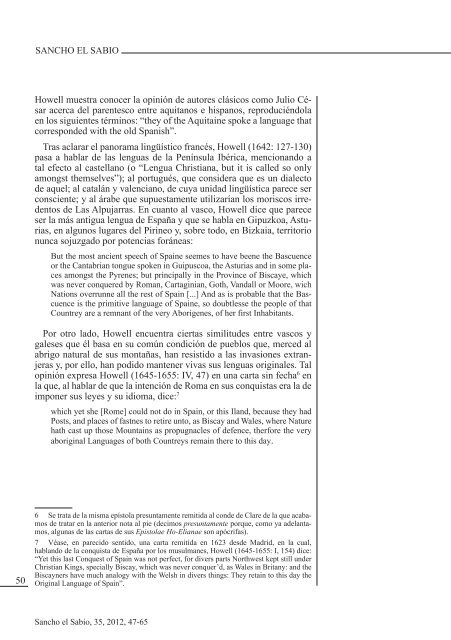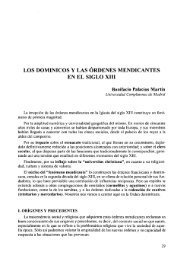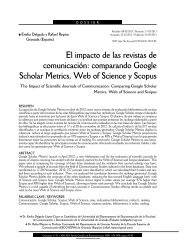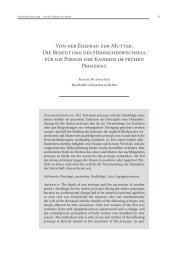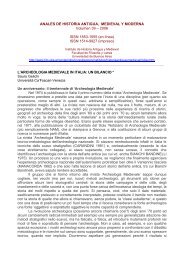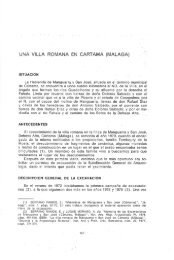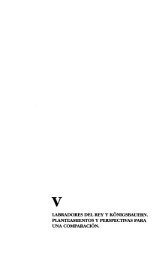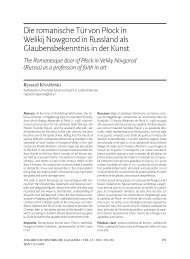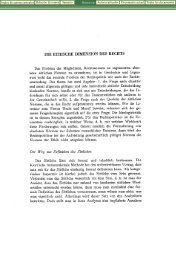Create successful ePaper yourself
Turn your PDF publications into a flip-book with our unique Google optimized e-Paper software.
50<br />
SANCHO EL SABIO<br />
Howell muestra conocer la opinión de autores clásicos como Julio César<br />
acerca del parentesco entre aquitanos e hispanos, reproduciéndola<br />
en los siguientes términos: “they of the Aquitaine spoke a language that<br />
corresponded with the old Spanish”.<br />
Tras aclarar el panorama lingüístico francés, Howell (1642: 127-130)<br />
pasa a hablar de las lenguas de la Península Ibérica, mencionando a<br />
tal efecto al castellano (o “Lengua Christiana, but it is called so only<br />
amongst themselves”); al portugués, que considera que es un dialecto<br />
de aquel; al catalán y valenciano, de cuya unidad lingüística parece ser<br />
consciente; y al árabe que supuestamente utilizarían los moriscos irredentos<br />
de Las Alpujarras. En cuanto al vasco, Howell dice que parece<br />
ser la más antigua lengua de España y que se habla en Gipuzkoa, Asturias,<br />
en algunos lugares del Pirineo y, sobre todo, en Bizkaia, territorio<br />
nunca sojuzgado por potencias foráneas:<br />
But the most ancient speech of Spaine seemes to have beene the Bascuence<br />
or the Cantabrian tongue spoken in Guipuscoa, the Asturias and in some places<br />
amongst the Pyrenes; but principally in the Province of Biscaye, which<br />
was never conquered by Roman, Cartaginian, Goth, Vandall or Moore, wich<br />
Nations overrunne all the rest of Spain [...] And as is probable that the Bascuence<br />
is the primitive language of Spaine, so doubtlesse the people of that<br />
Countrey are a remnant of the very Aborigenes, of her first Inhabitants.<br />
Por otro lado, Howell encuentra ciertas similitudes entre vascos y<br />
galeses que él basa en su común condición de pueblos que, merced al<br />
abrigo natural de sus montañas, han resistido a las invasiones extranjeras<br />
y, por ello, han podido mantener vivas sus lenguas originales. Tal<br />
opinión expresa Howell (1645-1655: IV, 47) en una carta sin fecha 6 en<br />
la que, al hablar de que la intención de Roma en sus conquistas era la de<br />
imponer sus leyes y su idioma, dice: 7<br />
which yet she [Rome] could not do in Spain, or this Iland, because they had<br />
Posts, and places of fastnes to retire unto, as Biscay and Wales, where Nature<br />
hath cast up those Mountains as propugnacles of defence, therfore the very<br />
aboriginal Languages of both Countreys remain there to this day.<br />
6 Se trata de la misma epístola presuntamente remitida al conde de Clare de la que acabamos<br />
de tratar en la anterior nota al pie (decimos presuntamente porque, como ya adelantamos,<br />
algunas de las cartas de sus Epistolae Ho-Elianae son apócrifas).<br />
7 Véase, en parecido sentido, una carta remitida en 1623 desde Madrid, en la cual,<br />
hablando de la conquista de España por los musulmanes, Howell (1645-1655: I, 154) dice:<br />
“Yet this last Conquest of Spain was not perfect, for divers parts Northwest kept still under<br />
Christian Kings, specially Biscay, which was never conquer’d, as Wales in Britany: and the<br />
Biscayners have much analogy with the Welsh in divers things: They retain to this day the<br />
Original Language of Spain”.<br />
Sancho el Sabio, 35, 2012, 47-65


